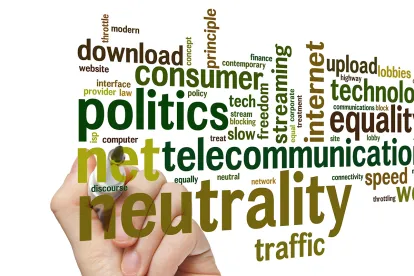As the coronavirus pandemic spreads across the world, forcing people into their homes, electronic communications have played and will continue to play a vital role in supporting families, businesses and individuals. Accordingly, electronic communications regulators across the globe are adapting their approach to regulation. Compliance with regulatory obligations continues to be important. However, regulators recognise that the impact of COVID-19 means that it will not always be possible to meet these obligations. In such circumstances, industry should take decisions that support critical services, vulnerable people and those who are relying on communications services. Some examples of this new pragmatic approach to regulation is provided below.
-
Increased demand for capacity
Many countries have introduced social distancing measures (closure of schools, closure of certain types of businesses and facilities), and many companies that were not forced to close have voluntarily switched to home-office regimes. Some electronic communications providers have reacted to the unusual situation and increased free minutes and mobile data plans or even offered unlimited mobile data to keep customers connected during the COVID-19 pandemic. In addition, some streaming platforms are offering free membership to help people cope with prolonged times of isolation at home (e.g. Amazon Prime Video is streaming kids’ movies and TV for free).
As a result, electronic communications traffic has significantly increased for teleworking, online teaching and entertainment purposes, raising worries that this could result in network congestion. Internet access services providers and Internet exchange hubs have reported record-setting increases in Internet traffic in recent weeks. For example, DE-CIX in Frankfurt, one of the world’s busiest Internet interconnection hubs, has reported a new all-time traffic peak of more than 9.1 Tbits/s and relayed some interesting statistics (e.g. 10% average data traffic growth, 100% rise in video conferencing or 50% growth in Content Delivery Networks traffic). The number of voice calls has also increased significantly – for example, AT&T and Sprint in the US have reported 44% increase of voice calls and 88% increase of Wi-Fi calling.
This increase in traffic may risk creating network congestion and may require the use of traffic management measures to avoid it. The European net neutrality regulation (Regulation 2015/2120) prohibits operators from blocking, slowing down or prioritising traffic. On the other hand, the Regulation allows the operators to apply exceptional traffic management measures to prevent impending network congestion and to mitigate the effects of exceptional or temporary network congestion, provided that equivalent categories of traffic are treated equally. The Body of European Regulators for Electronic Communications (BEREC) and European Commission issued a joint statement, encouraging a responsible use of such exceptional measures to prevent network congestion.
“The increase in Internet traffic has not led to a general network congestion so far,” the joint statement said. BEREC has set up a special reporting mechanism to monitor and respond to emerging capacity issues.
Streaming providers, such as Amazon, Facebook, Netflix or YouTube, have voluntarily committed to reduce their streaming bitrate in Europe (switching to standard definition streaming during peaks). Other platforms are believed to be doing the same.
In the US, the Federal Communications Commission (FCC) has granted AT&T, Verizon, T-Mobile, and US Cellular temporary access to more wireless spectrum access to help meet increased demand.
-
Informative text messages and alerts and emergency communications
In many countries around the world users receive warnings, tips or information in text messages sent by state authorities via mobile operators.
In addition, people may sign up for receiving alerts via various applications. For example, the World Health Organisation Health Alert brings COVID-19 facts to billions of people via WhatsApp.
This trend in fact anticipates what will become a regulatory requirement by 21 June 2022 under the new EU Electronic Communications Code, as all EU Member States will have to set up a so-called Public Warning System. This system will send alerts to all citizens and visitors’ mobile phones in a specific area in the event of a natural disaster, terrorist attack or other major emergency in their area.
In the US, the FCC issued an order declaring that hospitals, health care providers, state and local health officials, and other government officials may lawfully communicate information about COVID-19, as well as mitigation measures, without violating the Telephone Consumer Protection Act.
The FCC found that the current pandemic constitutes an imminent public health risk, and calls relating to the COVID-19 pandemic from health care providers meet the definition of “emergency communications.” However, the FCC cautioned that it will be vigilant in monitoring complaints about these calls and will not hesitate to enforce its rules when appropriate.
-
Providing location data
As part of an effort to curb the spread of Covid-19, location data can play a significant role, especially in identifying potentially infected persons by tracking of previous movements of those who were already diagnosed, for enforcement of quarantine orders and/or statistics purposes. It goes without saying, that, while the benefits of location data utilization are undoubtable, the issue is raising privacy concerns.
The UK data and privacy authority (Information Commissioner’s Office) confirmed that the government could use mobile phone data to fight the spread of COVID-19.
In the Czech Republic, mobile operators and IT companies will help to trace movement and contacts of those infected with the coronavirus. The tracing will be voluntary and based on the consent of the COVID-infected owner of a cell phone. A special localization call centre was established for calling the infected whose movements will be tracked based on the location data (using triangulation algorithm) in order to help them recall and identify all people they were in touch with in the past two weeks.
Last week, the Israel’s government has approved the use of the technology (that was initially developed for counterterrorism purposes) to track coronavirus patients and to notify those who may have come into contact with them, and also to enforce quarantine orders.
At the EU level, a common approach to location data sharing is being discussed. Thierry Breton, Internal Market Commissioner, held a videoconference with CEOs of European telecommunication companies and the association of mobile telecommunications operators (GSMA) to discuss the sharing of anonymised metadata for modelling and predicting the propagation of the coronavirus.
-
Keeping vital networks resilient
As a large proportion of the population works from home and schools have closed, industry has been working closely with governments to ensure that their networks remain resilient and continue to operate effectively.
The reliability of 999 and 112 calls is a critical priority. Under EU existing rules, for example, providers of publicly available telephone services must ensure that emergency calls can be connected at all times, even in challenging circumstances. Regulators are in contact with those responsible for connecting 999 and 112 calls and have received detailed assurances on the capacity and resilience of both services.
The ITU has also launched a new Global Network Resiliency Platform (REG4COVID) to help national policy-makers, regulators and providers to cope with increasing pressure put on the networks during the COVID-19 crisis.
-
Network construction and spectrum auctions
The current situation is also expected to slow down the roll-out of new 5G networks as both the supply of material and available of workforce may be affected. The outbreak of COVID-19 will also inevitably have an impact on financial and operational results of certain electronic communications providers, as they are forced to temporarily close some of their stores and also face roaming revenues plunging following severe travel restrictions.
Access to spectrum is also affected. Some of the scheduled 5G auctions have been postponed. For example, Austria postponed its 5G auction, originally scheduled to take place in April. The FCC delayed an auction of spectrum in the 3.5GHz (applications will now be due by 7 May rather than 9 April, bidding is set originally set to 25 June is postponed to 23 July). Further, the French regulator Arcep has reportedly decided to postpone the 5G auction scheduled in April to an unspecified date because of the coronavirus.
These challenges may make the case for network sharing even stronger than it already was prior to the crisis, to create synergies and reduce costs. The recent European Commission’s approval of the network sharing arrangement between Vodafone and TIM may provide additional useful pointers on how to structure network sharing to promote 5G and, at the same time, avoid regulatory and antitrust issues.
Conclusion
The current situation has confirmed the vital role of the electronic communications. For as long as the current emergency situation continues, the approach of electronic communications regulators across the glove is to remain vigilant but pragmatic and flexible, especially when it comes to the enforcement of net neutrality, network resilience, emergency communications, and network sharing for 5G roll-out.





 />i
/>i

